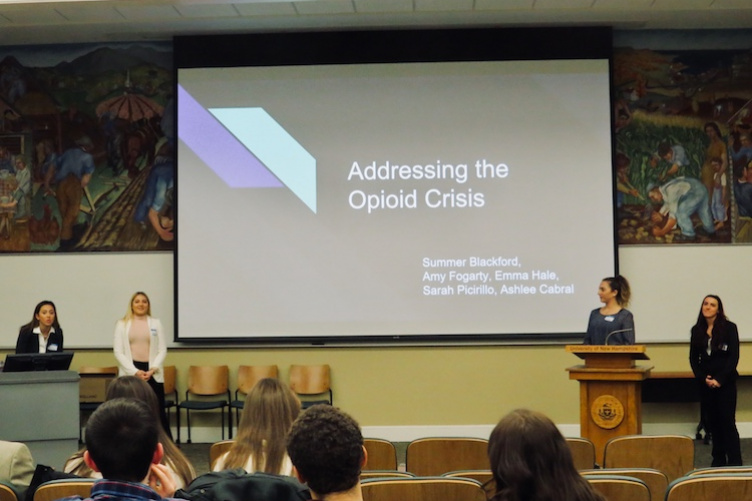
As final exams go, it may have been one of the more socially current: Students in Justice 501 were asked to present a solution to the opioid crisis in New Hampshire where, between 2010 and 2015, fentanyl overdoses rose more than 1,600 percent, and the state ranked second in the nation for opioid-related deaths. Meaning it was no small challenge.
The justice studies course provides an overview of the various procedures used in research. Working in teams, students devised plans that would test their ideas on how to address the opioid problem. They presented their proposals Dec. 13 to Donna Perkins, clinical associate professor, and Kirk Trombley, an adjunct professor who has been co-teaching the justice studies class with Perkins for several years.
“In the real world, most policymakers and stakeholders are interested in evidence-based approaches to solving issues."
Perkins and Trombley redesigned the course this year to have students collaborate to develop strategies that could help solve difficult social issues such as the current heroin and fentanyl problem.
“Because this is a research methods course, the students were required to design a methodologically sound research study,” Perkins says. “In the real world, most policymakers and stakeholders are interested in evidence-based approaches to solving issues. Before allocating what are often limited resources, they want to be sure that the newly proposed approach has empirical evidence to support the likelihood of its success.”
Study proposals ranged from youth education programs to training for doctors who prescribe pain medications to safe stations, where drug addicts can turn for support, to evaluating the effectiveness of amnesty programs that allow people to get help without fear of retribution. Included in the 10-minute presentations were explanations of how and when the teams would collect data as well as the qualitative procedures that would be used.
“We were very impressed with all the groups' presentations. They really took the challenge seriously and it showed,” Perkins says. “This kind of exercise prepares students to use their liberal arts education to address real-world issues.”
The seven teams competed for extra points toward their final grade. Earning 10 bonus points, the first-place team of David Anderson ‘18, Kellie Gilluly ‘19, Isaiah Hutchinson ‘18 and Casey O'Connor ‘19 designed a study to examine why people start using opioids to begin with and the reasons some people stop.
In second place, and earning five extra points, Jenna Hannafin ’20, Heidi Simoneau ‘19 and Bryan Wood ‘19 devised a study to determine whether mandating alternative pain treatment training for the prescribers of opioids would be successful in reducing the number of prescriptions written, possibly leading to a reduction in the number of overdose deaths.
Placing third for three bonus points, Ryan Clasby ‘18, Hayley Graton ‘19, Rudolph Hauser ‘19, Breanna Johnson ‘18 and Caitlin Walsh ‘19 crafted a study to explore the effectiveness in reducing opioid use with amnesty programs, which allow opioid users to turn in their drugs and paraphernalia without fear of legal consequences.
Interested in the justice studies dual major or minor in justice studies? Learn more here.
[links heroin series]
-
Written By:
Jody Record ’95 | Communications and Public Affairs | jody.record@unh.edu

















































